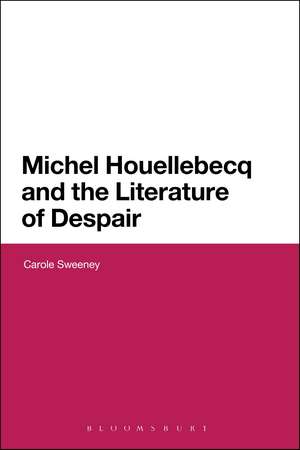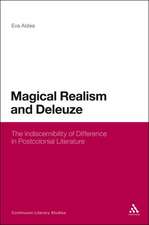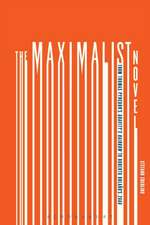Michel Houellebecq and the Literature of Despair
Autor Dr Carole Sweeneyen Limba Engleză Paperback – 20 mai 2015
| Toate formatele și edițiile | Preț | Express |
|---|---|---|
| Paperback (1) | 257.03 lei 43-57 zile | |
| Bloomsbury Publishing – 20 mai 2015 | 257.03 lei 43-57 zile | |
| Hardback (1) | 773.39 lei 43-57 zile | |
| Bloomsbury Publishing – 20 noi 2013 | 773.39 lei 43-57 zile |
Preț: 257.03 lei
Preț vechi: 295.14 lei
-13% Nou
Puncte Express: 386
Preț estimativ în valută:
49.18€ • 51.49$ • 40.70£
49.18€ • 51.49$ • 40.70£
Carte tipărită la comandă
Livrare economică 07-21 aprilie
Preluare comenzi: 021 569.72.76
Specificații
ISBN-13: 9781474239134
ISBN-10: 1474239137
Pagini: 224
Dimensiuni: 156 x 234 x 25 mm
Greutate: 0.34 kg
Editura: Bloomsbury Publishing
Colecția Bloomsbury Academic
Locul publicării:London, United Kingdom
ISBN-10: 1474239137
Pagini: 224
Dimensiuni: 156 x 234 x 25 mm
Greutate: 0.34 kg
Editura: Bloomsbury Publishing
Colecția Bloomsbury Academic
Locul publicării:London, United Kingdom
Caracteristici
Offers a comparative approach to Houellebecq's work, situating it within philosophical and literary traditions in French and reading his work alongside comparable American and British writers
Notă biografică
Carole Sweeney is Senior Lecturer in Modern Literature in the Department of English and Comparative Literature at Goldsmiths, University of London, UK.
Cuprins
Acknowledgments Introduction 1. Reception/Notes on Two Scandals 2. The 'Sixties gone toxic' 3. The Third Spirit of Capitalism? 4. Botched Subjects 5. The End of Sex ConclusionBibliography Index
Recenzii
Sweeney's monograph is the best in English so far ... Her close textual analyses are perceptive, well-written and sometimes even funny.
The volume contains an index and an extensive bibliography, incorporating Francophone and Anglophone work on Houellebecq and relevant theory ... [Sweeney's] delineation of the Houellebecquian oeuvre as an intensifying disengagement is unparalleled.
Sweeney's book is a painstakingly researched and carefully written study of Houellebecq's novels. It will provide students and scholars with a very thorough contextual understanding of the cultural origins of Houellebecq's ideas and with a bracing and persuasively argued critique of his various ideological positions.
'Vital exhaustion' - this book confronts what for Houellebecq is a key experience of the contemporary. Carole Sweeney steers readers through Houellebecq's paradoxical and multi-faceted response to emotional life under neoliberalism, and reminds us that behind all the controversy, this is a major thinker and a major chronicler of our times.
Writing clearly, and often sharply, Sweeney deftly situates her subject in France's ever-changing intellectual and political climate. Her study will interest literary and gender scholars, sociologists of knowledge, and historians; perhaps it should be required reading by economists and business leaders who have embraced American-style capitalism and its implicit claims to liberation.
The volume contains an index and an extensive bibliography, incorporating Francophone and Anglophone work on Houellebecq and relevant theory ... [Sweeney's] delineation of the Houellebecquian oeuvre as an intensifying disengagement is unparalleled.
Sweeney's book is a painstakingly researched and carefully written study of Houellebecq's novels. It will provide students and scholars with a very thorough contextual understanding of the cultural origins of Houellebecq's ideas and with a bracing and persuasively argued critique of his various ideological positions.
'Vital exhaustion' - this book confronts what for Houellebecq is a key experience of the contemporary. Carole Sweeney steers readers through Houellebecq's paradoxical and multi-faceted response to emotional life under neoliberalism, and reminds us that behind all the controversy, this is a major thinker and a major chronicler of our times.
Writing clearly, and often sharply, Sweeney deftly situates her subject in France's ever-changing intellectual and political climate. Her study will interest literary and gender scholars, sociologists of knowledge, and historians; perhaps it should be required reading by economists and business leaders who have embraced American-style capitalism and its implicit claims to liberation.













